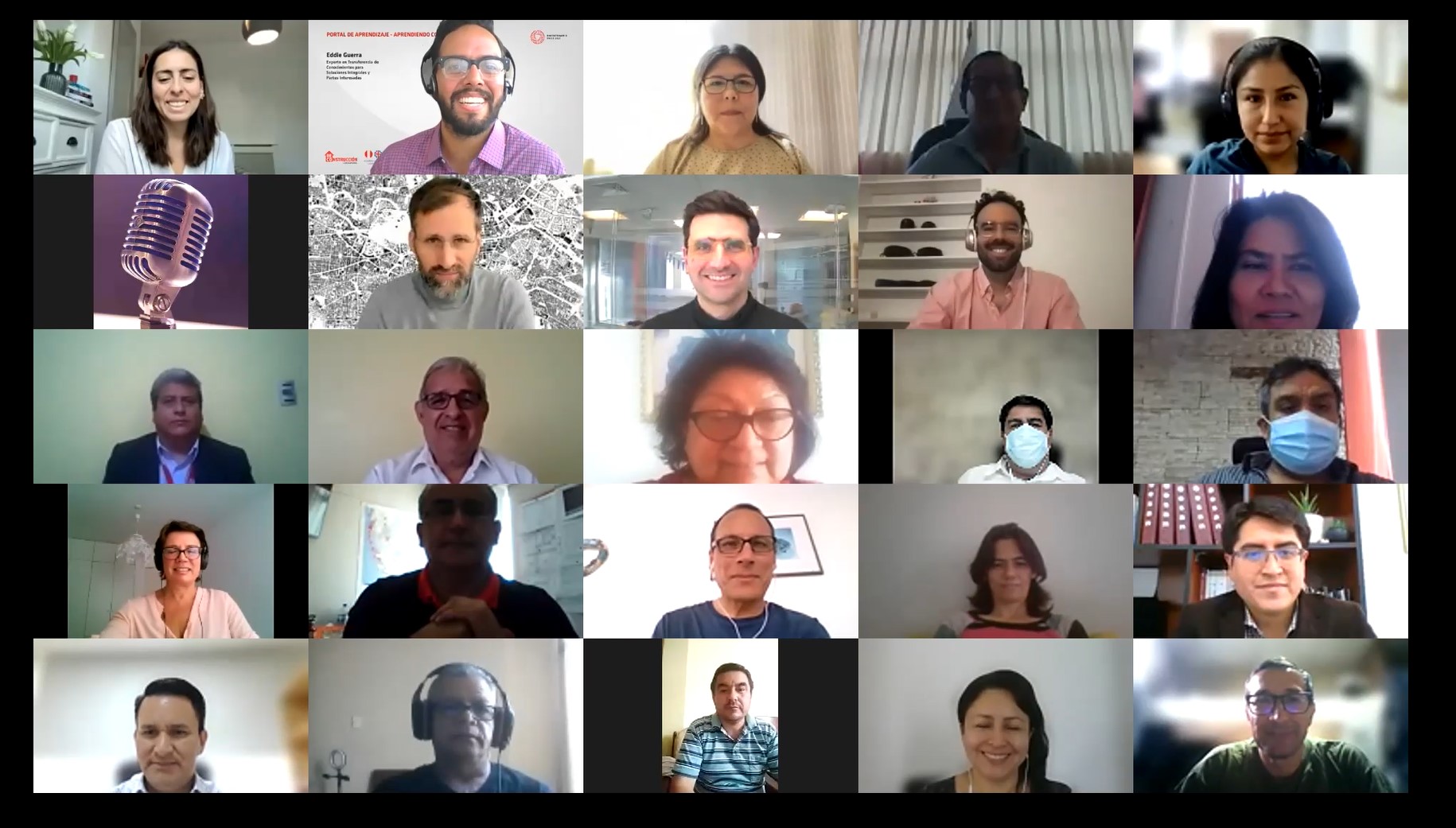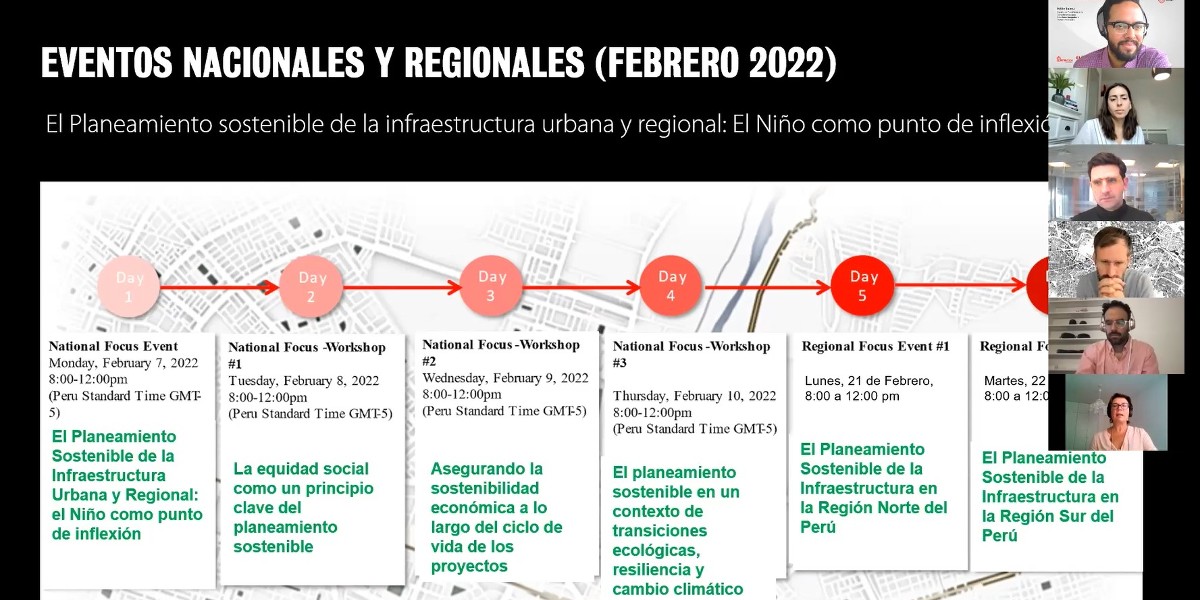Reflecting on the knowledge legacy potential of major infrastructure reconstruction programmes, Catalina Duarte, Martin Cornejo, and Anna Zucchetti review the experience of the Executive Programme on Sustainable Urban & Regional Infrastructure Planning (LSE-PS) designed and delivered by LSE Cities. The programme trained 350 Peruvian public officials involved in Peru’s national reconstruction programme, which was initiated after the El Niño floods of 2017.
In 2017 the El Niño events in Peru, exacerbated by climate change, severely impacted the country’s coastal regions, resulting in extensive flooding. Almost one million people were affected nationwide, 101 lost their lives and at least 353 were injured. The affected cities and regions also suffered from severe infrastructure loss and damage which required a large-scale infrastructure reconstruction programme. In response, the Peruvian government fostered a new institutional architecture under the National Reconstruction Authority (ARCC) to undertake a massive reconstruction process. As part of this process, the ARCC advocated a unique transfer of knowledge within the framework of the Government-to-Government (G2G) agreement between the Republic of Peru and the Government of the United Kingdom of Great Britain and Northern Ireland. In this agreement, LSE Cities at the London School of Economics designed and executed LSE-PS to encourage a new approach to sustainability as part of the reconstruction process.
From an LSE Cities perspective, the first strategic objective was to determine how best to assist Peruvian public officials to embed long-term environmental considerations when delivering infrastructure projects, as well as ensuring that a commitment to sustainability was integrated as a permanent practice when planning cities and regions.

The executive programme involved weekly sessions run by LSE Cities, which delivered comprehensive and tailored content via a dedicated digital learning platform. Through video lectures, readings, data and analysis, and case studies, as well as individual tasks, LSE-PS drew on key infrastructure delivery themes to raise questions on environmental, social, and economic issues. These individual learning sessions were accompanied by frequent live virtual sessions to review key learnings. Overall, participants were able to step back and appreciate the broader picture and see how their immediate roles fitted with the overarching priorities and realities. Perú is not alone in tackling these challenges.
Most countries worldwide have faced similar events, with some adopting long-lasting practices and experiences and testing innovative concepts and frameworks that have informed reconstruction processes. By building on this global agenda, the Peruvian task force capitalised on the significant potential within the reconstruction process, using it as a unique opportunity to address deeper questions. It also allowed them to reflect on how to bring about a fundamental transformation within the existing planning process and be better prepared for future events. For example, participants were asked to discuss key issues such as rising urbanisation rates, issues of equity, access to services, and alternatives to urban sanitation (amongst others) before discussing specific projects or examining topics such as blue-green infrastructure in more depth.
The second strategic objective was to discuss viability and sustainability issues around the reconstruction projects, which are often designed and implemented under emergency conditions. This was particularly relevant since all stakeholders – public institutions, the private sector and, more importantly, the people affected directly and indirectly – demanded immediate solutions. As we encouraged participants to think beyond pure infrastructure delivery, they applied several analytical tools such as the five-case model and the sustainable livelihoods framework to identify key actors, address conflicting interests, and encourage broad participation even when planning for the unexpected.
During our online national and regional workshops, participants also had the chance to discuss ongoing projects and apply these same analytical tools. This hands-on experience allowed them to analyse aspects of governance, social equity, economic, ecological, and territorial sustainability in the specific context of Peru. By exploring how infrastructure projects impact different types of assets, participants could link planning practices to the viability and sustainability of reconstruction projects.

LSE Cities wanted to ensure knowledge retention and the development of expertise within Peru in the wake of this project. The LSE-PS content would only become relevant if learnings were introduced and cultivated within the Peruvian task force, which was then applied in day-to-day activities. This was especially challenging in the context of the public sector in Perú (as in all Latin American countries), which experiences regular staff turnover. Moreover, the global pandemic meant that this programme needed to be delivered entirely online, adding to the natural language barrier and time difference practicalities.
Several strategies were put in place to deal with these logistical challenges. First, in coordination with the ARCC, we encouraged the selection of participants at both national and regional levels. Second, where possible, the programme prioritised senior participants who were less likely to significantly change their job/role. Diversity was also taken into account both across sectors and in terms of the level of involvement with the reconstruction process. The programme content was also delivered entirely in Spanish using several video voiceovers and translators to guarantee better comprehension of the topics. Lastly, as part of the live sessions and workshops, we encouraged online forums in which participants were able to share ideas and thoughts with each other. This certainly helped them identify opportunities for daily collaboration.
Overall, the LSE-PS’ structure and content successfully contributed to a culture of learning and application by developing a legacy of capabilities around infrastructure sustainability within Peru's public sector to achieve the goal of a more equitable, greener, and sustainable future for all.
About the authors:
Catalina Duarte, Programme management and delivery, LSE Cities; Martin Cornejo-Presbitero, Programme management and delivery, LSE Cities; Anna Zucchetti, Course facilitation and lecturer, LSE Cities.
Visit the programme page